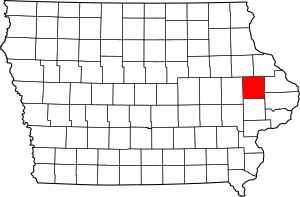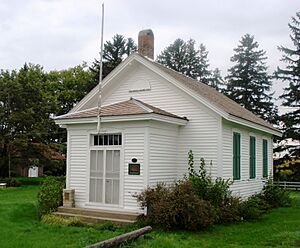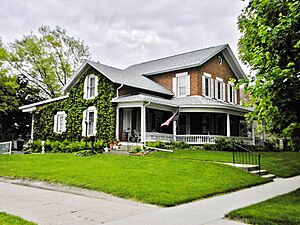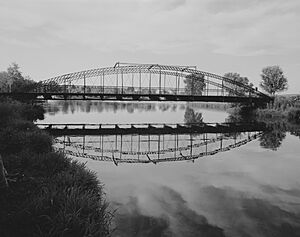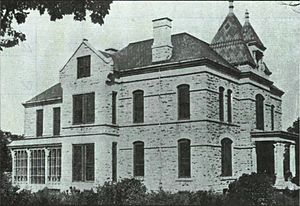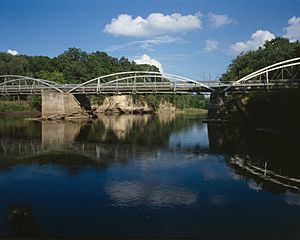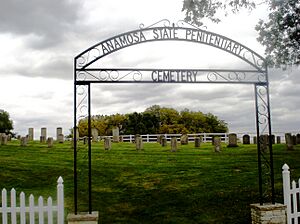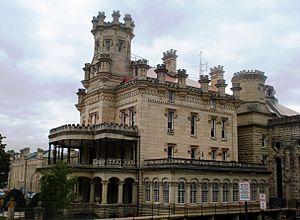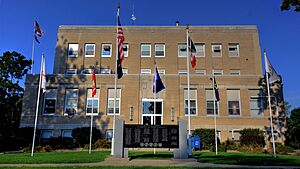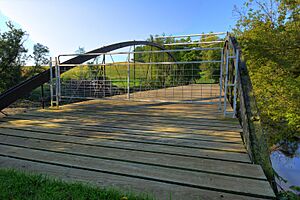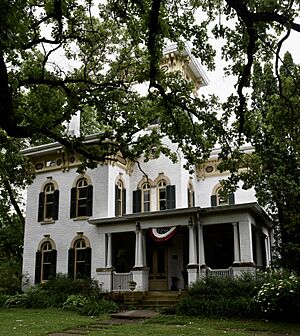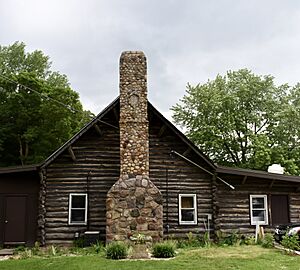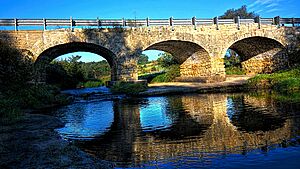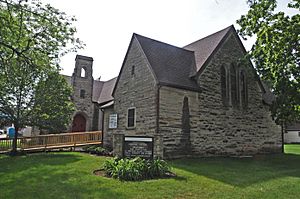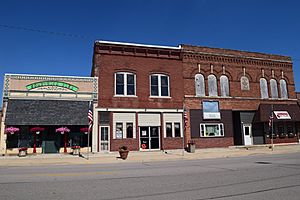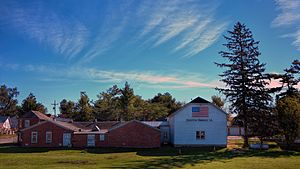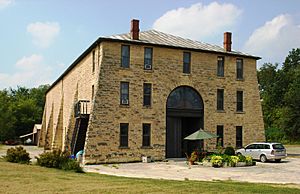National Register of Historic Places listings in Jones County, Iowa facts for kids
Hey there, young history explorers! Did you know that all across the United States, there are special places that are super important because of their history, architecture, or even what happened there? These places are listed on something called the National Register of Historic Places. It's like a hall of fame for buildings, bridges, and even whole neighborhoods that tell amazing stories about the past.
In Jones County, Iowa, there are many cool spots that have earned a place on this special list. Let's take a journey to discover some of these historic treasures!
Contents
Historic Gems in Jones County, Iowa
Anamosa's Historic Spots
Anamosa is home to many fascinating historic places.
- Anamosa Main Street Historic District
- This district includes several blocks of West Main Street, East Main Street, and parts of Ford and Garnavillo Streets. It's a whole area recognized for its historic buildings. Imagine what these streets looked like when they were first built!
- Anamosa Public Library
- Located at 100 East 1st Street, this beautiful building has served the community for many years. Libraries are often important centers for learning and history.
- Antioch School
- You can find this old school building about 4 miles east of Anamosa on Iowa Highway 64. It reminds us of how kids used to learn in the past.
- Edmund and Mary Ann Walworth Booth House
- This historic house at 125 South Ford Street was once home to Edmund and Mary Ann Walworth Booth. Houses like this give us a peek into how families lived long ago.
- Farm No. 1, Iowa Men's Reformatory
- This area, located west of Buffalo Creek on County Trunk Highway E28, was part of the Iowa Men's Reformatory. It's a historic district that tells a story about the state's past.
- Fremont Mill Bridge
- This bridge is now a pedestrian path over a small pond in Central Park. It's a cool example of old bridge design.
- John A. Green Estate
- West of Anamosa, off U.S. Route 151, you'll find the John A. Green Estate. Estates like this often have grand old homes and interesting stories.
- Hale Bridge
- This bridge crosses the Wapsipinicon River on 100th Street, near Oxford Junction. It's another example of historic engineering.
- Iowa Men's Reformatory Cemetery
- Also located west of Buffalo Creek on County Trunk Highway E28, this cemetery is part of the history of the Iowa Men's Reformatory.
- Iowa Men's Reformatory Historic District
- This large historic district on North High Street includes the main buildings of the former reformatory. It's a significant part of Anamosa's history.
- Jones County Court House
- The county courthouse at 500 West Main Street is where important legal and government activities happen. It's a landmark in Anamosa.
- Lower Road Bridge
- This bridge on Buffalo Road crosses a branch of the Wapsipinicon River. It's another historic bridge in the area.
- Rick's Brewery
- Located at 12412 Buffalo Road, Rick's Brewery is a historic site that tells about the area's industrial past.
- Col. William T. and Elizabeth C. Shaw House
- This house at 509 South Oak Street was the home of Colonel William T. and Elizabeth C. Shaw. It's a great example of historic residential architecture.
- State Quarry, Iowa Men's Reformatory
- This quarry, located along the eastern side of Buffalo Creek northwest of Anamosa, was connected to the Iowa Men's Reformatory. It shows how resources were used in the past.
- Wapsipinicon State Park Historic District
- Found at 21301 County Road E34, this state park is recognized as a historic district. It's a place where nature and history come together.
Monticello's Historic Sites
Monticello also has its share of historic places.
- Ely's Stone Bridge
- Northwest of Monticello, on Hardscrabble Road, you can find Ely's Stone Bridge. Stone bridges are often very old and show amazing craftsmanship.
- S.S. Farwell House
- The S.S. Farwell House is at 301 North Chestnut Street. It's another example of a historic home in Monticello.
- Moore's Ford Bridge
- This bridge on 25th Avenue crosses White Water Creek. It's a historic bridge that has stood the test of time.
- Odd Fellows Hall
- Located at 203 West 1st Street, the Odd Fellows Hall was a meeting place for a fraternal organization. These halls often have unique architecture.
- St. Luke's Methodist Church
- You can find this church at 211 North Sycamore. Historic churches are important parts of a community's heritage and often feature beautiful designs.
Olin's Business History
- Business Part of Olin Historic District
- This district covers both sides of the 300 block of East Jackson and part of East 2nd Streets. It shows how businesses operated in Olin's past.
Wyoming's Medical History
- Dr. Martin H. Caulkins House and Office
- Located at Washington and Main Streets, this building served as both the home and office of Dr. Martin H. Caulkins. It's a glimpse into early medical practices.
Scotch Grove's Historic Structures
- Corbett's/Eby's Mill Bridge
- This bridge spans the Maquoketa River in Scotch Grove Township. Bridges are vital connections and often have interesting engineering.
- Scotch Grove Historic District
- This district is found at the junction of Iowa Highway 38, 116th Avenue, and County Road E17. It's a whole area that preserves the history of Scotch Grove.
Stone City's Unique Heritage
- St. Joseph's Roman Catholic Church
- This church at 12472 County Road X28 in Stone City is a beautiful historic building. Stone City is known for its unique stone architecture.
- Stone City Historic District
- This district includes several roads like Stone City Road, Dearborn Road, and County Road X28. Stone City is famous for its buildings made from local limestone.
Cascade Vicinity's Hidden History
- Farm Creek Historic District
- The exact address for this district is restricted, but it's located in the vicinity of Cascade. Historic districts often protect groups of buildings or landscapes that share a common history.
- Kenny Farmstead Archeological District
- Also in the Cascade vicinity with a restricted address, this site is important for its archaeological findings, which can tell us about even older times and how people lived.
These historic places in Jones County are like open books, each telling a part of Iowa's story. Visiting them can be a fun way to connect with the past and see how much things have changed, and how much they've stayed the same!


